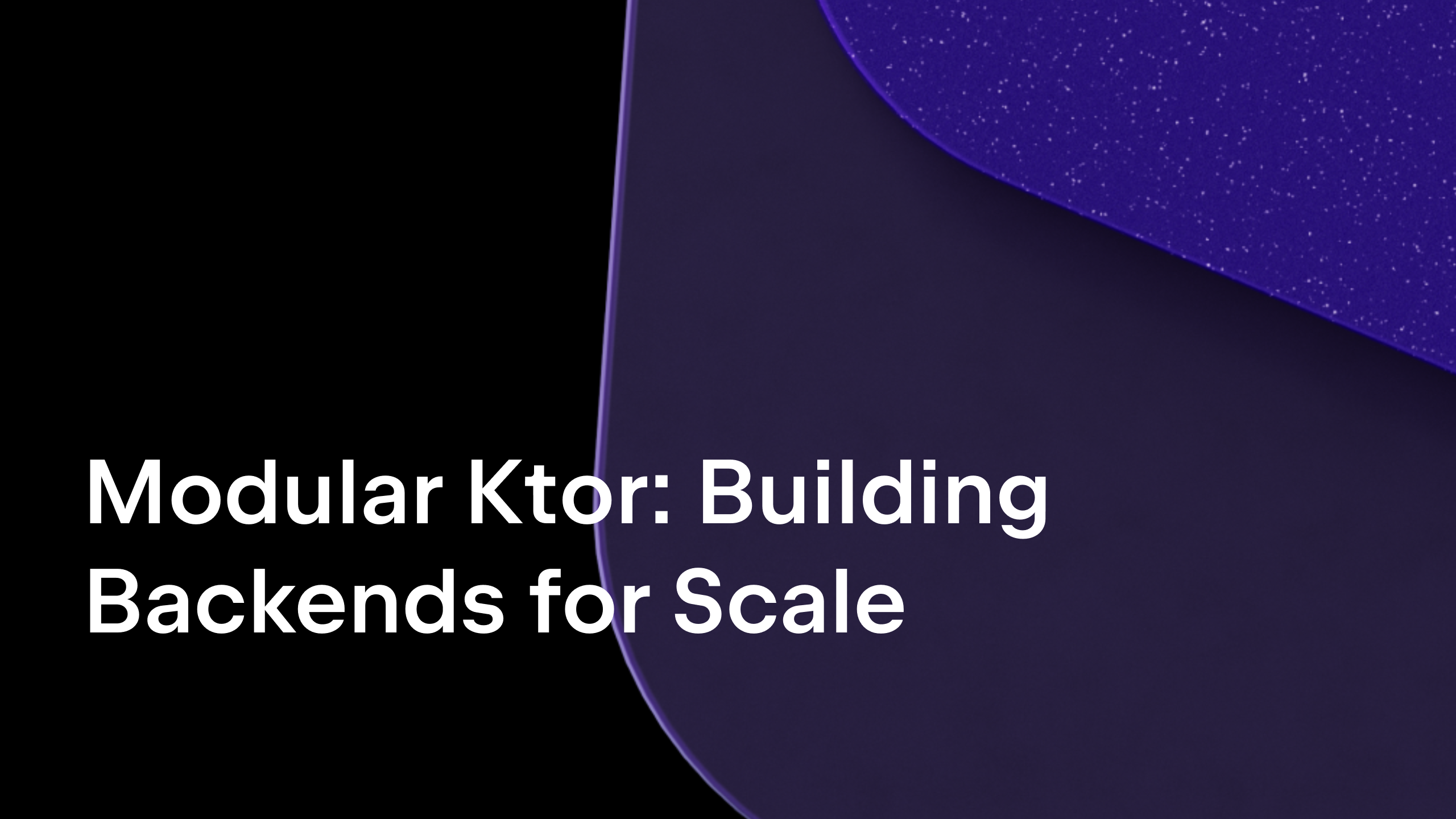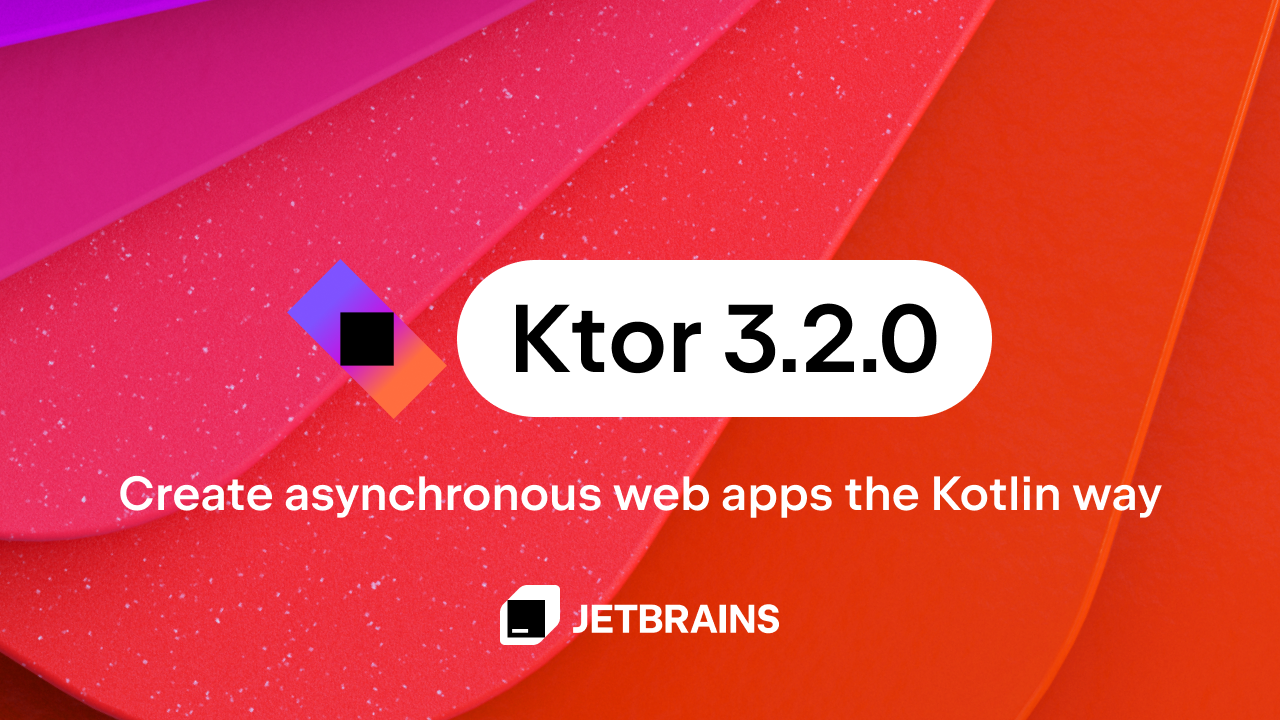Kotlin
A concise multiplatform language developed by JetBrains
The Ktor Roadmap for 2024
As in 2023 and 2022, we have been working on a roadmap for our development of Ktor for the year ahead. In the interests of transparency and accountability, we would like to share our plans with you here.
Our ongoing plan
Our ongoing plans and goals for Ktor remain consistent with previous years. We aim to keep the framework lightweight, flexible, and transparent, so our users can easily create powerful and maintainable services and clients.
With each new release, we try to improve the quality and performance of the features we provide, while simultaneously expanding our ecosystem of Ktor plugins. This involves introducing new plugins to simplify existing use cases (like transaction handling) and adding support for new ones (such as Observability and gRPC).
Along with improving the core product, we want to make the development experience easier for our users. We aim to make the plugin ecosystem easier to work with and to remove impediments to community contributions. We are also working to improve the range, quality, and variety of the documentation we provide.
Lastly, we want to take advantage of the stabilization of Kotlin Multiplatform (KMP) and the growing ecosystem of multiplatform libraries. Our goal is to make the benefits of KMP available to Ktor developers and empower them to create multiplatform applications.
New features
We intend to deliver the following new functionality in 2024:
OpenTelemetry plugins
We plan to introduce OpenTelemetry plugins for Ktor Client and Server, which will enable you to generate telemetry data (metrics, logs, and traces) and advertise it for collection.
gRPC based services
We have already been working to add gRPC support. In 2024, we will integrate gRPC into both Ktor Client and Server via an idiomatic Kotlin implementation. This will make creating and consuming gRPC-based services as natural and familiar as HTTP and REST.
Migration to Kotlinx-io in Ktor 3.0.0
Kotlinx-io is a multiplatform library that provides abstractions for data sources and destinations. Before Ktor 3.0.0 becomes final, we intend to replace the existing bespoke networking types with those provided by Kotlinx-io. This will make it much easier for creators of multiplatform libraries to support Ktor Client and Server. With this update, the existing IO functionality will become deprecated in Ktor 3.0.0 and will be removed in Ktor 4.0.0.
Add support for managed transactions
At present, Ktor services require manual management of database transactions, which is appropriate in complex scenarios. However, in many cases, it is preferable to start a transaction at the beginning of the request and commit it at the end, provided there are no errors.
In 2024, we will introduce an official plugin that implements this behavior. This will simplify database access while providing support for recovering from SQL and application-specific exceptions.
Simplified dependency injection
Until now, we have been agnostic on dependency injection (DI) libraries, preferring to allow users to integrate their preferred products as they see fit. However, many users have asked for explicit recommendations on how to integrate frameworks like Koin into Ktor-based services.
In response to this, we will officially add support for DI into Ktor Server in 2024, and publish guidelines on how best to integrate existing DI libraries.
For more details on formal DI support in Ktor, read our follow-up article.
Making Ktor development better
Along with adding new features to Ktor, we will be making changes that simplify the development process and expand your potential options:
Improved documentation
Based on the feedback we received over the past year, our focus for 2024 is on enhancing current content quality and expanding support with new materials. Our primary goal is to make the learning journey more flexible and straightforward – a goal we aim to achieve over several iterations:
- Extending, improving, and streamlining the tutorials in the Getting Started sections of the Ktor Server and Ktor Client documentation.
- Addressing cloud deployment and configuration topics.
- Introducing a comprehensive guide on full-stack development with Kotlin Multiplatform.
- Increasing the scope of API coverage in our documentation.
We are also planning structural changes. Tutorials will seamlessly complement each other, interlinking topics more efficiently, and Server and Client content will be reorganized to ensure clearer distinctions.
All of these additions will take advantage of a modernized look and feel, plus integration with the documentation for other JetBrains frameworks and libraries.
A plugin registry
Currently, the online project generator only offers plugins created by the Ktor team. While users can create and integrate their own plugins into services, there is no way to register them for other teams to use. This impedes the growth of the Ktor community.
To fix this, we will introduce a mechanism for accepting third-party Ktor plugins.
This will consist of:
- A new, simplified format for creating Ktor plugins. This format will enable you to include all of the information needed to register and display the plugin within the project generator.
- A new version of the project generator, with support for registering external plugins.
- A procedure for submitting a pull request to the Ktor team in order to begin the process of evaluating and registering a third-party plugin.
A command line tool
At present, we recommend creating new Ktor-based projects using either the online project generator or the wizard in IntelliJ IDEA Ultimate. While these two methods cover most scenarios, there is demand for a command line-based alternative. This would allow users to create and modify projects within the terminal or shell.
In response to this demand, we will publish a CLI Tool for Ktor in 2024.
Conclusions
We hope these plans sound exciting and address any outstanding issues you may have with the framework. Thanks to everyone who helps keep the Ktor community flourishing and expanding, whether through contributions, feedback, patronage, or advocacy. If you would like to comment on these plans or suggest additional features, we encourage you to join the discussion on the Ktor channel of Kotlinlang Slack (request an invite to Slack).
Subscribe to Kotlin Blog updates








